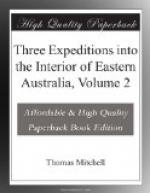The grassy plains which extend northward from these thinly wooded hills to the banks of the Murray are chequered by the channels of many streams falling from them, and by the more permanent and extensive waters of deep lagoons. These are numerous on the face of the plains near the river, as if intended by a bounteous Providence to correct the deficiencies of too dry a climate. An industrious and increasing people may always secure an abundant supply by adopting artificial means to preserve it and, in acting thus, they would only extend the natural plan according to their wants. The fine climate is worthy of a little extra toil, especially in those parts at a distance from the surplus waters of the large rivers, and in places considered favourable in other respects either for the rearing of cattle or for cultivation.
In the western portion small rivers radiate from the Grampians an elevated and isolated mass presenting no impediment to a free communication through the fine country around its base. Hence that enormous labour necessary to obtain access to some parts, and for crossing continuous ranges to reach others by passes like those so essential to the prosperity of the present colony, might be in a great degree dispensed with in that southern region.
Towards the south coast on the south and adjacent to the open downs between the Grampians and Port Phillip, there is a low tract consisting of very rich black soil, apparently the best imaginable for the cultivation of grain in such a climate.
WOODS.
On parts of the low ridges of hills near Cape Nelson and Portland Bay are forests of very large trees of stringybark, ironbark, and other useful species of eucalyptus, much of which are probably destined yet to float in vessels on the adjacent sea.
HARBOURS.
The character of the country behind Cape Northumberland affords fair promise of a harbour in the shore to the westward. Such a port would probably possess advantages over any other on the southern coast; for a railroad thence, along the skirts of the level interior country, would require but little artificial levelling and might extend to the tropical regions or even beyond them, thus affording the means of expeditious communication between all the fine districts on the interior side of the coast ranges and a sea-port to the westward of Bass Strait.
THE MURRAY.
The Murray, fed by the lofty mountains on the east, carries to the sea a body of fresh water sufficient to irrigate the whole country, which is in general so level even to a great distance from its banks that the abundant waters of the river might probably be turned into canals for the purpose either of supplying deficiencies of natural irrigation at particular places, or of affording the means of transport across the wide plains.




